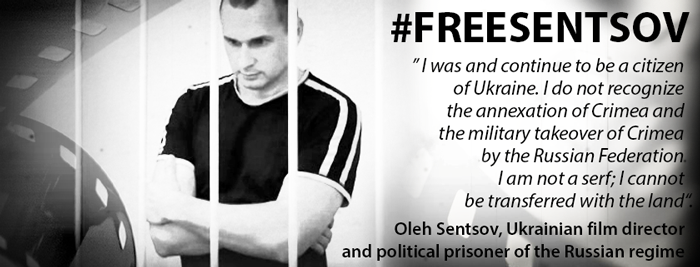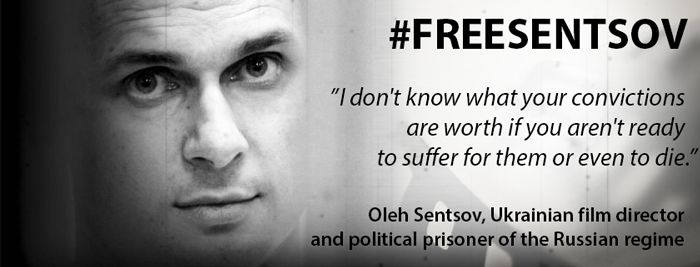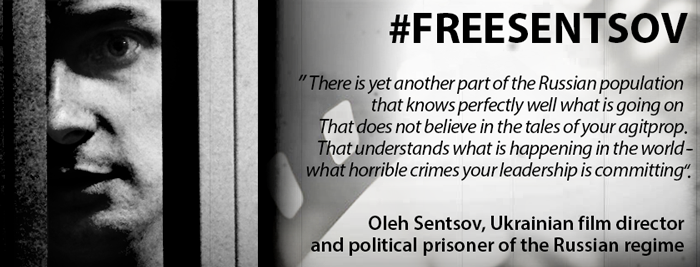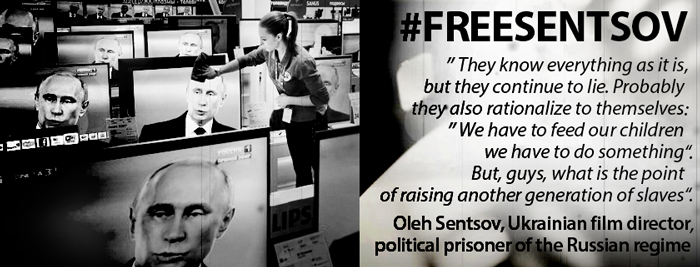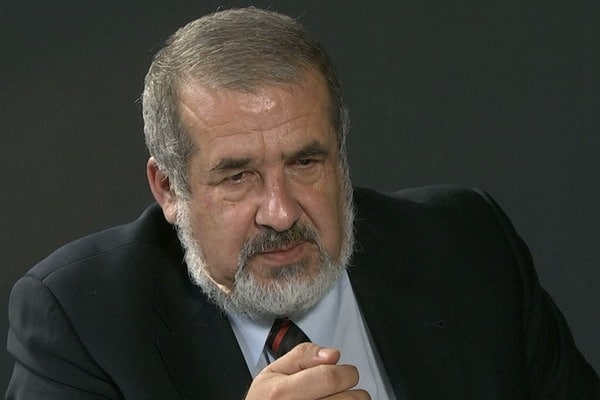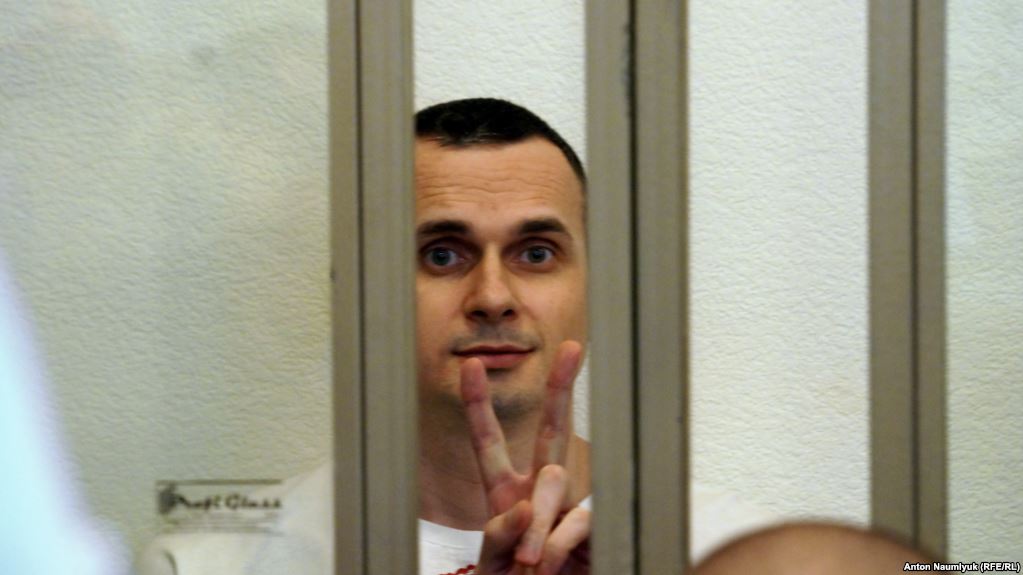Sentsov was arrested by the Russian FSB on 11 May 2014, shortly after the Russian occupation of Crimea. Together with three other Ukrainians, Oleksandr Kolchenko, Henadiy Afanasiev, and Oleksiy Chirniy he was illegally transferred to Russia and is being charged in "plotting terrorist acts." These charges are entirely based on testimonies of Chirniy and Afanasiev, both of whom have stated that they were tortured by the FSB. On 31 July 2015, Afanasiev retracted his testimony, leaving the accusation in shatters, but the four activists were still sentenced to long terms in prison; of them, Sentsov was punished most heavily, having been sentenced to 20 years. Over the more than four years of his imprisonment, he has remained unbroken and had for 145 days held a hunger strike, demanding to release the circa 70 Ukrainian political prisoners of the Kremlin, who, like him, are imprisoned by Russia without a crime.
Sentsov was chosen from a shortlist of three by the European Parliament’s political group leaders on 25 October.
Announcing this year’s laureate, Parliament President AntonioTajani said:
"Through his courage and determination, by putting his life in danger, the filmmaker Oleg Sentsov has become a symbol of the struggle for the release of political prisoners held in Russia and around the world. By awarding him the Sakharov Prize, the European Parliament is expressing its solidarity with him and his cause. We ask that he be released immediately. His struggle reminds us that it is our duty to defend human rights everywhere in the world and in all circumstances."
Here are are some of Sentsov's most impassioned words:
On Russian court’s attempt to consider him a Russian citizen:
I was and continue to be a citizen of Ukraine. I do not recognize the annexation of Crimea and the military takeover of Crimea by the Russian Federation. I am not a serf; I cannot be transferred with the land.
From his latest speech at trial in Rostov-on-Don on 19 August 2015:
A court of occupiers by definition cannot be just. Don't take it personally, your honor!
A big betrayal sometimes begins with a small act of cowardice. Like when they put a bag over your head and beat you and after half an hour you are ready to renounce all your convictions and accuse yourself of anything, to accuse others, just so they will stop beating you.
I don't know what your convictions are worth if you aren't ready to suffer for them or even to die.
On Afanasiev, the witness who retracted his testimony as given under torture:
I am glad for him because he will be able to live the rest of his life and know that he is a human being who did not give in to fear even though they continue to threaten him, to pressure him, to kick him, to threaten him. But he already stepped in that direction, made a proper step, and you can't make him go back. I am very glad for him.

Even I -- sitting here in prison -- know that your troops are fighting in Donbas. Our jails are full of fighters who are sent there -- like heroes -- on your tanks, with your weapons. They will return, bringing back their weapons, and they will be met at the border and thrown in prison.
There is yet another part of the Russian population that knows perfectly well what is going on. That does not believe in the tales of your agitprop. That understands what is happening in the world -- what horrible crimes your leadership is committing."
On Russian propaganda channels:
There, for example, stand the troubadours of your regime, and they are not stupid fellows. They know everything as it is, but they continue to lie. Probably, they also rationalize to themselves: "We have to feed our children; we have to do something." But, guys, what is the point of raising another generation of slaves?
We also had a criminal regime, but we came out against it. In the end, we won. The same thing will happen with you, sooner or later. I wish for you to be governed by criminals no longer.
The only thing I can wish to this third, informed part of the Russian population is to learn how to not be afraid!
The Sakharov Prize for Freedom of Thought, named in honor of the Soviet physicist and political dissident Andrei Sakharov, has been awarded annually since 1988 to individuals and organizations defending human rights and fundamental freedoms. This year marks the 30th anniversary of the prize. The prize, consisting of consisting of a certificate and €50,000 will be awarded during a ceremony in the Parliament in Strasbourg on 12 December. Sentsov was among three finalists for the 2018 Sakharov Prize. The other two are the NGOs protecting human rights and saving migrant lives across the Mediterranean Sea and Nasser Zefzafi, the leader of Hirak, a mass protest movement in the Rif region in Morocco.
Read more:
- Imprisoned Ukrainian filmmaker Oleg Sentsov stops hunger strike on day 145
- French celebrities launch chain hunger strike in support of Oleg Sentsov and other Ukrainian political prisoners of the Kremlin
- On hunger strike since May, Oleg Sentsov is ready to die in protest against Putin’s imperialism
- Filmmaker Sentsov launches hunger strike until Russia releases all Ukrainian political prisoners
- Ukrainian filmmaker on hunger strike for 70 Ukrainian hostages asks G7 to help them all
- Russia sends photos of imprisoned Ukrainian filmmaker on 88th day of his hunger strike
- “The Trial,” documentary about Oleg Sentsov, opened for free international screenings
- EU parliament calls to release Sentsov and all Ukrainian political prisoners of the Kremlin
- World intellectuals implore politicians to boycott World Cup until Russia frees Ukrainian political prisoners
- From Crimea to Siberia: the prisons where Russia holds hunger-striking political prisoners Sentsov&Kolchenko
- The Sentsov-Kolchenko case: what you need to know
- Ukrainian filmmaker on 87th day of hunger strike in Russian prison writes that “end is near”


